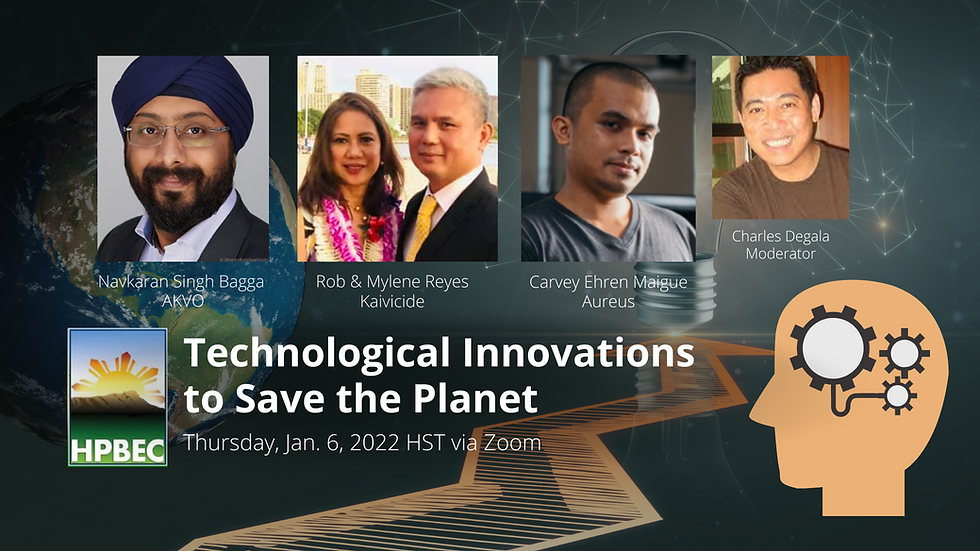Sharing Best Practice Policies in Climate Change and Environment Issues
- HPBEC

- Sep 2, 2021
- 3 min read
GOVERNANCE: Saving the Earth through Environmental Legislation, Developing Policies for a Green and Sustainable Philippines, Freedom from Fossil Fuels—the Hawaii Strategy, Ocean Dynamics--Its impact on Island Communities

Developing Policies for a Green and Sustainable Philippines
Ma. Luisa D. Daya-Garcia is one of the Philippines’ leading green architectural resource experts and is known as the Philippines’ Queen of Green. She is recognized for her environmental advocacy and is among the first 100 Filipino ASEAN Architects -- the only one to specialize in integrated sustainable building ecology and one of the first BERDE Certified Professionals. She is one of the founders and current chair of the Green Architecture Advocacy Philippines (GreenAP) and the Green Restorative Actions and Sustainable Solutions (GRASS). She also leads three more environmental committees under the UAP and has been mentoring LGUs nationwide in sustainable city planning. To date, her biggest environmental task is to develop a standard for climate-smart buildings in the Philippines under the United Nations Development Program (UNDP).
Saving the Earth through Environmental Legislation
Antonio A. Oposa Jr. is one of Asia’s leading voices in the global arena of Environmental Law. His work is internationally known for establishing in the Philippines’ highest Court of Law the principle of inter-generational responsibility. His enforcement work, both in the Courts and on the field, has earned him the prestigious TOYM (The Outstanding Young Man) of the Philippines award and the highest UN recognition in the field of the Environment—the UNEP Global Roll of Honor. He has organized and led some of the most daring direct action enforcement operations against environmental crime syndicates. In 2008, after a ten-year legal battle against twelve Philippine government agencies, he won an unprecedented case to compel these agencies to clean up Manila Bay. He holds a business degree from the De La Salle University, a law degree from the University of the Philippines and his Master of Laws from the Harvard Law School.
Demystifying Legal and Policy Issues Around Climate Change, Environment and Sustainable Development
Aya de Leon is director and co-founder of Parabukas. She has worked on policies and programs to address climate change and environmental degradation, promoting social, governance, and environmental safeguards. She is a Trustee of the Climate Justice Fund and SALIGAN, and is part of the law faculties of the University of the Philippines and De La Salle University. She led the climate change and environment team of the Ateneo de Manila School of Government for three years, handling project management, training, research, and network-building. Aya obtained her LL.M. and specialization in environmental law from the University of Hawai'i, and her J.D. from the University of the Philippines. She was also a Graduate Degree Fellow at the East-West Center. She has a keen interest in good environmental governance and promoting citizens’ access to information, participation, and justice, especially through legal education and communications.
Ocean Dynamics--Its impact on Island Communities
Rosie ʻAnolani Alegado is an Assistant Professor of Oceanography and Sea Grant at UH Mānoa. She completed her postdoctoral work in evolutionary biology at UC Berkeley and holds a PhD in Microbiology and Immunology from Stanford and a BS in Biology from MIT. In partnership with Paepae o Heʻeia, her group has tracked the influence of restoration, storms and multi-annual climate patterns on the health of Heʻeia Fishpond since 2014. With the non-profit Kuaʻāina Ulu ʻAuamo and Hawai’i Sea Grant, she is involved in developing kūlana noiʻi, a process wherein researchers build and sustain equitable partnerships with community. She is deeply committed to increasing participation of underrepresented minorities in STEM supporting programs that provide individualized mentoring and peer support for undergraduates transitioning from community colleges to Mānoa. In 2018, she was confirmed to the City & County of Honolulu Climate Change Commission.
Moderator
David M. Forman joined the UH Law School faculty full-time in 2010 and is the Director of its Environmental Law Program and Faculty Specialist with the Ka Huli Ao Center for Excellence in Native Hawaiian Law. He is a member of various international environmental group and a co-founder of the Tony Oposa Intergenerational Moot Court, an innovative, collaborative moot court designed to highlight cutting edge international issues and their impact on future generations. He has written numerous articles and delivered multiple presentations on environmental and cultural resources law, civil rights, and social justice issues. He is a graduate of the William S. Richardson School of Law and received one of its first Environmental Law Certificates. He also obtained a Graduate Ocean Policy Certificate from the School of Oceans, Earth Sciences & Technology at the University of Hawai’i in Manoa.




Comments